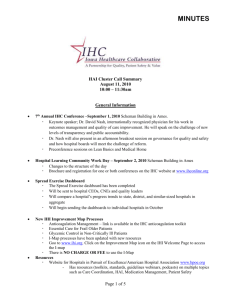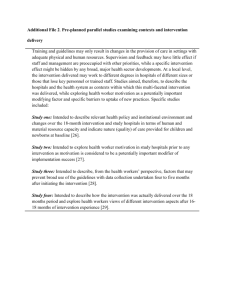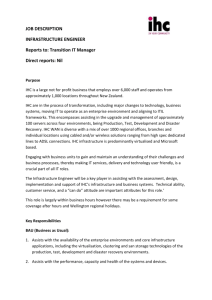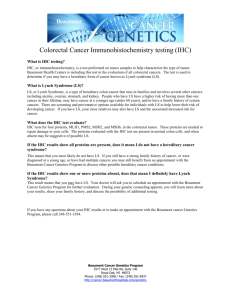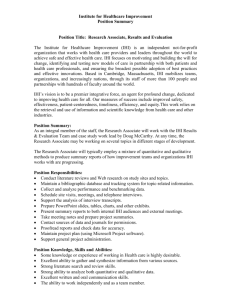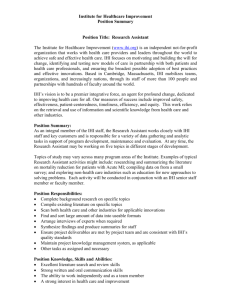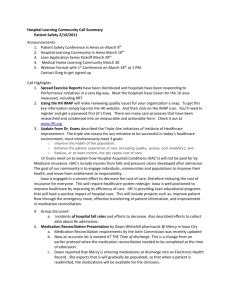Iowa Healthcare Collaborative Hospital Learning Community
advertisement
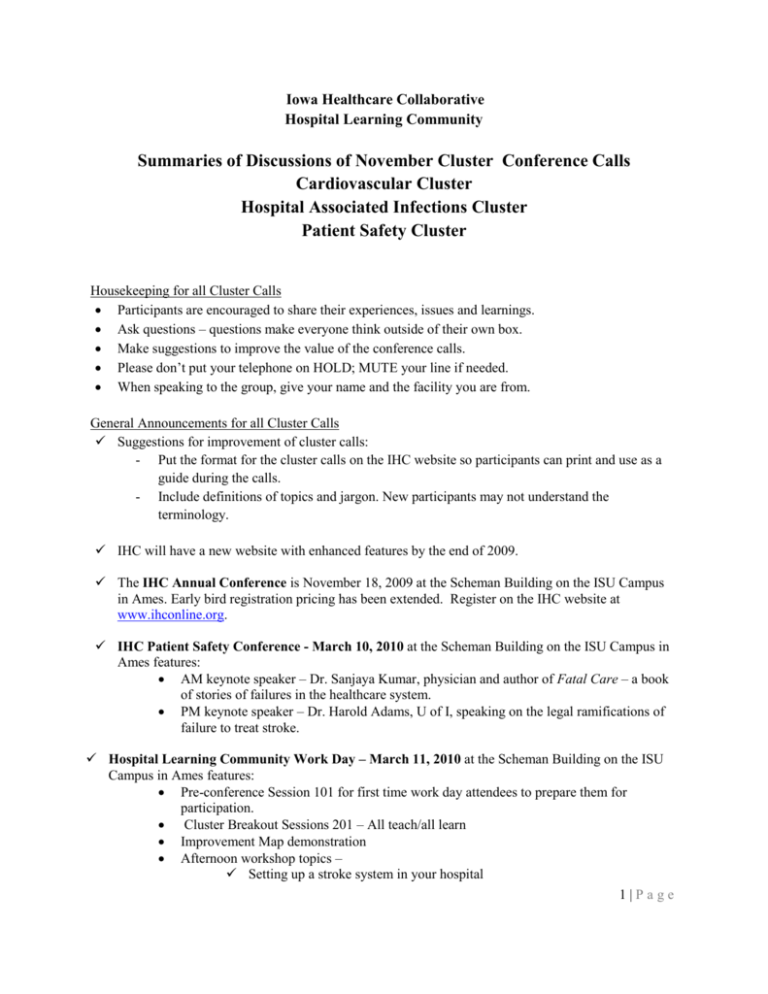
Iowa Healthcare Collaborative Hospital Learning Community Summaries of Discussions of November Cluster Conference Calls Cardiovascular Cluster Hospital Associated Infections Cluster Patient Safety Cluster Housekeeping for all Cluster Calls Participants are encouraged to share their experiences, issues and learnings. Ask questions – questions make everyone think outside of their own box. Make suggestions to improve the value of the conference calls. Please don’t put your telephone on HOLD; MUTE your line if needed. When speaking to the group, give your name and the facility you are from. General Announcements for all Cluster Calls Suggestions for improvement of cluster calls: - Put the format for the cluster calls on the IHC website so participants can print and use as a guide during the calls. - Include definitions of topics and jargon. New participants may not understand the terminology. IHC will have a new website with enhanced features by the end of 2009. The IHC Annual Conference is November 18, 2009 at the Scheman Building on the ISU Campus in Ames. Early bird registration pricing has been extended. Register on the IHC website at www.ihconline.org. IHC Patient Safety Conference - March 10, 2010 at the Scheman Building on the ISU Campus in Ames features: AM keynote speaker – Dr. Sanjaya Kumar, physician and author of Fatal Care – a book of stories of failures in the healthcare system. PM keynote speaker – Dr. Harold Adams, U of I, speaking on the legal ramifications of failure to treat stroke. Hospital Learning Community Work Day – March 11, 2010 at the Scheman Building on the ISU Campus in Ames features: Pre-conference Session 101 for first time work day attendees to prepare them for participation. Cluster Breakout Sessions 201 – All teach/all learn Improvement Map demonstration Afternoon workshop topics – Setting up a stroke system in your hospital 1|Page NHSN reporting for HAIs Transitioning patients home – reducing readmissions Spread Exercise Changes – A new Spread Exercise reporting tool is in development for 2010. IHC will continue to monitor implementation of improvement strategies in 2010. Some initiatives seem to have stalled in their implementation progress. Those hospitals will be offered assistance in identifying and overcoming barriers. IHC will also focus on sustainability strategies for hospitals that have achieved full implementation of initiatives. IHC will not track Boards on Board and CFO Engagement initiatives in 2010. Improvement Map – You can access the IHI Improvement Map at: www.ihi.org/IHI/Programs/ImprovementMap or Google IHI Improvement Map. A video tour of the I-Map is available on the IHI website. The I-Map provides 68 improvement topics for hospitals. It is a comprehensive resource of improvement elements by topic, including key measures, standards, guidelines, resources and a list of mentor hospitals for the topic. Cardiovascular Cluster Call November 3, 2009 10:00am Call Summary Heart Failure The American College of Cardiology and IHI have a joint initiative called H2H (Hospital to Home) designed to reduce 30-day, all cause readmission rates for patients discharged with heart failure and AMI by 20% by December 2012. Dr. Craig Clark, a cardiologist with Iowa Health Heart will present on H2H at the IHC Patient Safety Conference on March 10, 2010. 2nd quarter ’09 Spread data showed that 87% of Iowa hospitals reported full implementation of the heart failure measures. 2009 implementation goal is 80%. Readmission rates for heart failure, barriers and challenges were discussed. Identification of admitted patients with the diagnosis of heart failure continues to be a challenge. Patients may be in several days before the diagnosis is made. A suggestion was made to treat all potential heart failure patients as though they had heart failure until the primary diagnosis has been determined. Apply the old adage, “If it looks like heart failure, treat it like heart failure” until you know for sure. Cass County Hospital, Atlantic, has specific questions on their electronic admission form. If a response is yes to any of the questions, or if a patient has a history of heart failure, or if an echocardiogram is requested, a printout is generated to the Quality Department. Other hospitals also have electronic records that generate a daily report of potential heart failure patients. 2|Page The situation was presented that sometimes the information on the discharge summary, the discharge instructions and the medication list don’t match. The physician may dictate the discharge summary on the day the patient is discharged and nurses may never see it so it is difficult to ensure accuracy. It was noted that coders also struggle with the principle diagnosis of heart failure. Some hospitals have staff who work with physicians to determine correct diagnosis. AMI AMI can be found on the I-Map. There was no discussion on this topic. Aortic Dissection (AD) IHC will track the implementation of the Aortic Dissection Bundle in 2010 through the Spread Exercise. An AD toolkit can be found on the IHC website: http://www.ihconline.org/toolkits/aorticdissection.cfm Several Iowa hospitals have incorporated the three AD questions into their ED intake assessments. Dr. Tony Piskoc from Nebraska Methodist Hospital, Omaha, shared that those hospitals with Cerner and McKesson electronic platforms will have the AD bundle included on their intake forms in the near future. He noted that new AD treatment guidelines will be out in December. Dr. Piskoc referenced an article on a patient with AD in a recent edition of the U of I publication, Pacemaker. http://www.uihealthcare.com/news/pacemaker/2009/summer/aortic_dissection.html Dr. Piskoc noted that the article incorrectly listed vulnerable populations for AD as people in their 50s, 60s, and 70s. AD can occur at any age and is not limited to adults or elderly. Stroke It was noted that most recently, Alegent Mercy Hospital in Council Bluffs became the 9th hospital in Iowa to become Joint Commission-certified as a primary stroke center. Stroke Management can be found on the IHI Improvement Map.. Next Cardiovascular Cluster Call – February 9, 2010 3|Page Hospital Associated Infections (HAI) November 4, 2009 10:00am Call Summary Improvement Suggestion for the HAI Cluster Call: A different ICP could talk on each call about what they are doing at their hospital. Lisa Caffery, Genesis Medical Center - Davenport facilitated the HAI discussion. Catheter- Associated Urinary Tract Infection (CAUTI) IHC will begin tracking implementation of the CAUTI bundle through the Spread Exercise in 2010. CAUTI is a topic on the IHI Improvement Map. A CAUTI toolkit can also be found on the IHC website: http://www.ihconline.org/toolkits/cauti.cfm The following information was shared: Some hospitals have developed criteria for appropriate Foley catheter insertions; some are using more straight caths. Criteria may often need to be patient-specific, depending on the patient condition and situation. Some are focusing on staff education on catheter care. One hospital is trialing the use of stickers to remind physicians that the patient has a catheter. Nurses and ward clerks will apply the stickers. Daily assessments of the continued need for a catheter are done in some facilities. HAI/MRSA The issue of transferring patients with MRSA from long term care facilities was discussed. It was noted that nursing homes are required to keep a list of patients with MRSA but the information often isn’t provided when the patient is admitted to the hospital. Better communication between long term care facilities and hospitals is needed. Some hospitals already have an area on their transfer forms to indicate if the patient has MRSA or MDRO but often that area of the form isn’t completed. The suggestion was made that a standard statewide transfer form might be helpful. Lisa Caffery, Mary Rexroat, and Trula Foughty will initially meet to discuss development, then expand to include district consultants and LTC contacts. Some hospitals have MDRO information populated into their electronic nursing assessments. Hospitals are taking various approached to address admissions from LTC facilities: - Some swab the nares of admitting LTC patients for MRSA; if positive, patient is placed in contact isolation. 4|Page - It was noted there is often no guidelines for removing the patient from isolation. The Iowa Antibiotics Resistance Task Force document is a good resource. Surgical Site Infections (SSI)/ Surgical Care Improvement Project (SCIP) SCIP can be found in the IHI Improvement Map. There was no discussion on this topic. Surgical Safety Checklist Will be tracked in the 2010 IHC Spread Exercise. Central Line Infections (CLI) Can be found in the IHI Improvement Map. Trinity, Quad Cities reports that a CLI Maintenance Line Bundle has been implemented housewide. A dedicated team does the insertions and dressing changes. Marvis will share their CLI Maintenance Bundle when it is finalized. Ventilator Associated Infections (VAP) Can be found in the IHI Improvement Map. Monica Gordon from Mercy Hospital, Des Moines, reported that she attended a Mayo Clinic Quality and Safety Conference recently. She shared that some initiatives being done in Mayo’s PCIU to reduce CLIs included fewer accesses to the central line, scrubbing the hub for 15 seconds, and then allowing it to dry for 15 seconds before access. The University of Iowa has created a video on preventing VAP and posted it on YouTube. It is called “VAP Busters” and performed to the music of Ghost Busters. Click the link to see the video. http://www.youtube.com/watch?v=T34K8qBXHBQ There was a brief discussion on the H1N1 flu. Genesis Hospital in Davenport has created a separate triage area for patients presenting with flu symptoms to help ease the burden of flu patients in the ED. However, if patients present to the ED, they cannot be redirected to the triage area; they must be evaluated in the ED due to EMTALA guidelines. In Atlantic, a strong community education initiative directed people to call their health care providers if they were experiencing flu symptoms rather than to go to the ED. Next HAI Cluster Call - February 10, 2010 10:00AM H:\Cluster Calls\Minutes\11.09 Cluster Call Miutes.doc 5|Page
